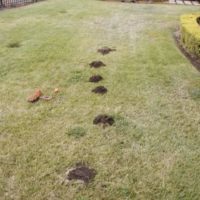First of all, before we get to cinch mole trapping, I always like to mention when discussing moles that they are meat eaters and not plant eaters. Moles in the garden and on farms are good allies because they aerate the soil as they tunnel for food. In lawns they can be tolerated because they are not eating your lawn but they are smothering it with soil which can be unsightly. Cleaning up soil from large hills can minimize damage to a tolerable level. If you want to know more about moles read this article: Don’t Make a Mountain out of a Molehill
Moles are a little more of a challenge to trap than gophers. These creatures have more of an ability to learn as they are in the shrew family unlike the gopher belonging to the rodent family. They are known to become trap shy and avoid steel objects in the ground. Having regular patterns, moles do use some of their runs or burrows on a daily basis. Concurrently, some burrows are used once or rarely. Therefore, your first task is to identify which runs are used most often. Also, there are two distinct kinds of mole burrows, the surface, or feeding runs, which are just below the surface look like this:

Or, the mounds created when a mole is digging a deeper permanent burrow look like this:
 [/expand]
[/expand]
Cinch Mole Trapping-Surface Burrow Trapping
You can spot and follow tunnels, finding where they seem to join together or where they follow along a curb, driveway, side of a building or garden border.
If tunnels are not found along a border you can stomp down a few sections of the raised run and check the next day to see if they are raised again indicating that the mole has used the tunnel again. This means you have found a good trapping site. Open the burrow in each direction and place two Cinch traps, one in each direction like this;

You may have to wait a day or two until the mole comes back through this surface tunnel. If a trap is sprung without catching anything, reset and wait. If the mole tunnels around the trap try a different trap set location in deeper burrow tunnel.
Cinch Mole Trapping-Deep Burrow Trapping
You can always tell when you have deep mole burrows by the series of mounds that are formed by moles bringing soil to the surface while excavating deep tunnels. The soil has to go somewhere, so they push it out and make a mound.
These piles are almost always at the end of a lateral tunnel off the main tunnel. and look like this;

You can trap in these tunnels easily without a lot of work using the Hori Hori tool to open the tunnels. (one of the best all around gardening tools as well)
Check back the next day and see if you were successful. If the tunnels are too deep for this method to work easily do one of two things. Either try another spot or get out a shovel, excavate and set traps in the tunnel hole. In my opinion and in my trapping business doing as little damage to the landscape is the preferred if possible.
Cinch Mole Trapping-Trapping Along an Edge
It has been my experience that trapping along an edge like a driveway, wall, rock border or anything that moles follow along is the most successful trapping site. They are also the easiest to set up. This is because the Cinch trap has the extended jaws enabling them to have a long reach under objects.
Here are some examples of these kind of sites
Cinch Mole Trapping-Trapping In Mole Mounds
Trapping in mole mounds is probably the least successful of all the methods but is very easy to set up and requires no real effort in finding the burrow.
Remember that these mounds are just used for excavating soil while the burrow is being dug. So, you must follow the mounds and find the newest one. Try to find one that is smaller and fresh. The hope is that the mole will soon be bringing more soil up out of the tunnel.

Here is a site where the mole is very active and I have chosen a couple of likely spots
In conclusion I have to say there are an incredible amount of different mole traps on the market. I have purchased and used most of them and am always trying new techniques and traps. The Cinch trap remains the most versatile of them all and is the easiest to carry around. If you are a home owner or a professional the combination of the Cinch and the Hori Hori is the best I have ever found.
Good luck and happy trapping, Thomas Wittman







